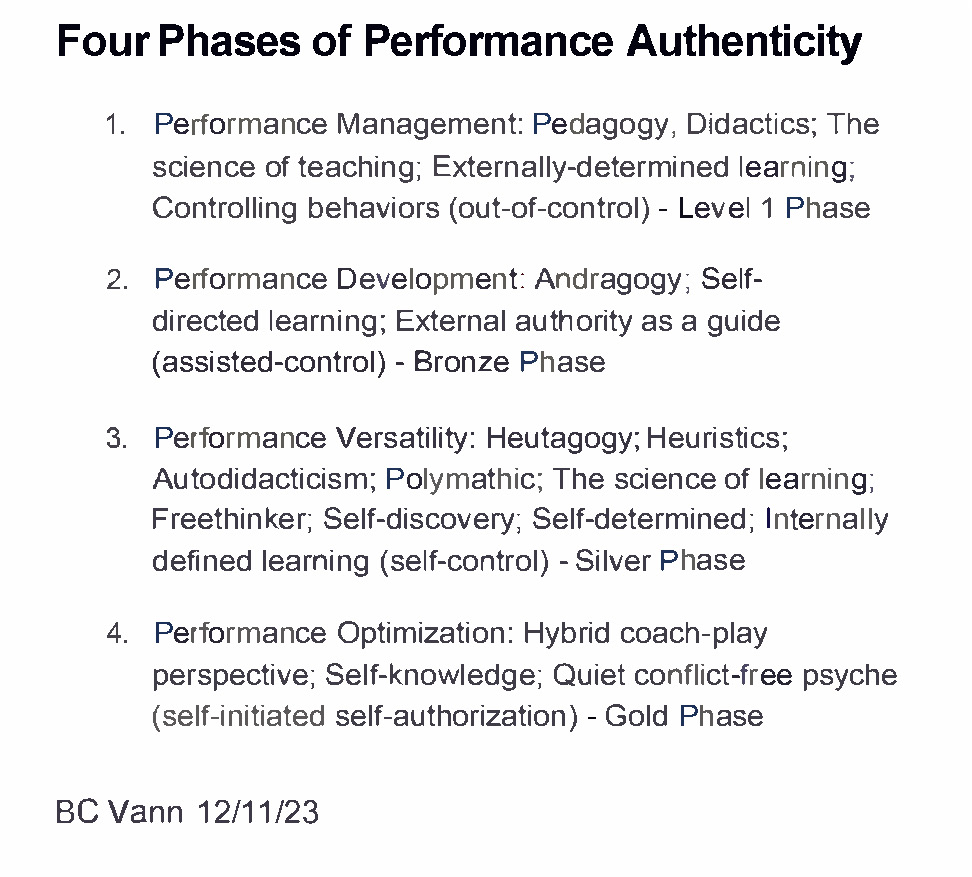As Your Resource For Self-Development
- The Optima Bowling Coach (2025)
Self-Control
(Page Updated 1/25/24)
During the 1970s, behavioral science uncovered a natural, effective, and efficient human behavior model called "Perceptual Control Theory." PCT has proven that humans control perceptions, not behaviors. From this fact, I proposed the question, self-control or assisted-control?
As mentioned in the Optima Bowling Coach-Play Clinic page, the workout focuses on four questions:
- Self-control or assisted-control?
- What is your game?
- Aware of interconnections?
- What do you want to achieve?
Self-control or assisted-control?
What is the purpose of the question, self-control or assisted-control?
- I am not talking about controlling your behaviors or habits.
- I am suggesting that the practice of controlling specific preferred behaviors is at the out-of-control learning level.
- I would not ask or force anyone that is not out-of-control to do that.
- I have listed four performance learning levels (see below) to help you answer the question.
Controlling behavior is complicated in the short term and impossible to sustain long-term. So, you may be thinking, how can I accomplish my goals without controlling my behavior? And you know Bruce, business leaders, educators, coaches, politicians, preachers, and parents would disagree with what you are selling here.
But, there is always a but; I am encouraged by the advanced psychological research on the topic. Perceptual control theory will replace the paradigm of behavior control. So please, prove it to yourself, do your research of behavior as the control of perception. We do not control our behaviors. Behavior is the control of perceptions.
If we want to practice the envisioned radical coaching approach, designed to save ourselves from our socially-conditioned-behavior-controlling-selves, an understanding of self-control is essential. Self-control is the initiation step to progress to performance optimization. And the perceptual control theory is the mechanism to accomplish the radical bowling coach system proposed herein the Optima Bowling Coach research and development site.
Self-Control as a Living Control System:
The opportunity of self-control requires that one controls perceptions. The PCT model of our natural learning mechanism has proven the traditional controlling behaviors paradigm to be an illusion.
First, basically, at our current level of evolution (Homo Sapiens), the PCT model shows how the human brain functions as an 11-level hierarchy of perceptual control systems. Moreover, individual learning is driven by reorganizing this hierarchy as necessary to develop one’s innate capability fully or, more simply, rearrange them to get what one wants.
If we expect to practice self-control, we have no choice but to understand ourselves as controlling people and then optimize the functionality of perceptual control.
Self-Control and Education:
As envisioned, the bowling academy teaching and learning environment will feature four learning levels of performance:

The simplest approach to a quick understanding of PCT:
Read “Controlling People, The Paradoxical Nature of Being Human” by Richard S. Marken and Timothy A. Carey (2015). Experiencing one’s innate capacity of self-control is at times unpredictable.
Here’s a couple excerpts from the book:
This book… is about the fact that we are all controlling people, and that it is completely normal to be one. Indeed, it is just human nature.
But we didn’t write this book to say ‘you are a controlling person but that’s okay’… We wrote it mainly because we want you to know that your controlling nature can actually work against you, causing you to lose control. This is a paradox, and a challenge for our lives, because our feeling of wellbeing depends on staying in control. We want things to be the way they should be and when they are not – when we lose control – we feel stressed, depressed, or anxious. Yet our efforts to be in control are often the reason we lose it. (Pg. vi)
Self Control Research Resources:
- “Behavior: The Control of Perception" by William T. Powers
- “Making Sense of Behavior, The Meaning of Control” by William T. Powers
Back To: Bowling Coach-Play Clinic
Back To: How to Control Your Life